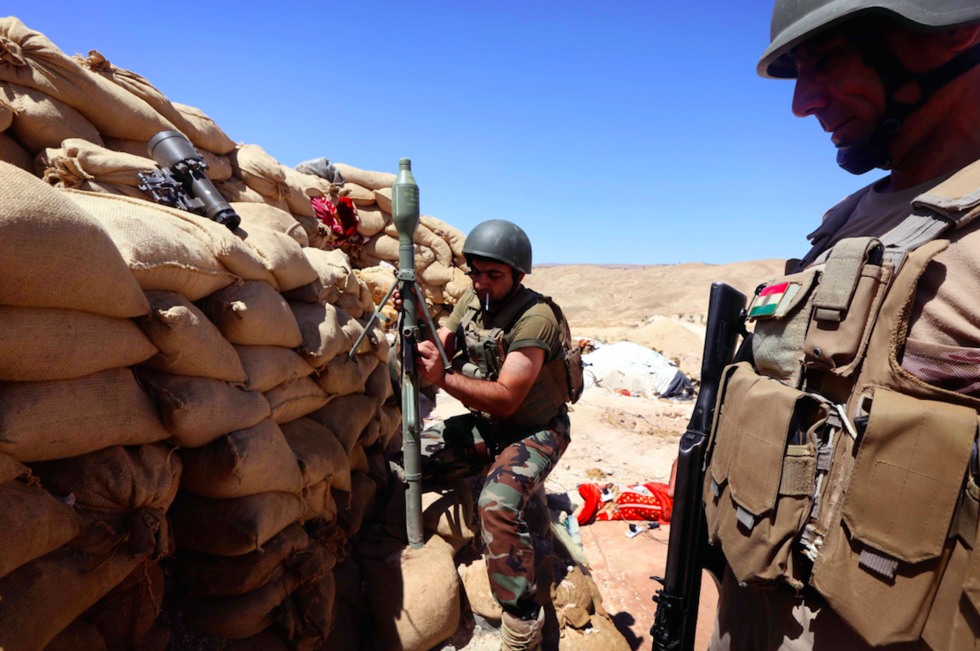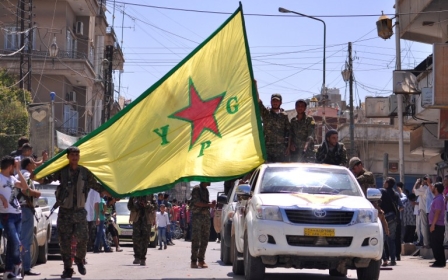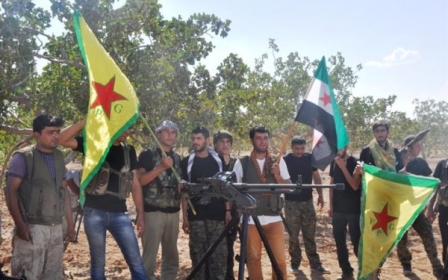ANALYSIS: The risks of the coalition's Kurd-heavy anti-IS strategy

The US-led coalition has made Iraqi and Syrian Kurdish forces primary allies against the Islamic State group, but over-reliance on the Kurds carries risks, analysts have warned.
As the world seeks to turn up the heat on IS, the West is expected to rely even more on the Kurdish Peshmerga forces from Iraq's autonomous Kurdish region and the Kurdish People's Protection Units (YPG) in Syria.
The Kurds have been key partners on the ground, proving to be some of the most effective anti-IS forces in the region, although their successes have largely been confined to Kurdish dominated areas.
The first soldiers officially deployed by the United States to Syria arrived last week in the north to train the YPG, a group which has close ties to Turkey's Kurdistan Workers' Party (PKK) which is seen as a terrorist organisation in Turkey and the West but has also been notched up significant military successes against IS.
However, over-relying on the Kurds could throw up a plethora of other challenges, analysts warn.
Military action should be matched with political planning for the post-IS era in Iraq and Syria, and that relying too heavily on the Kurds could backfire.
The lack of a roadmap addressing Kurdish statehood aspirations is an incentive for groups to secure as many future bargaining chips as possible by winning military brownie points now.
Maria Fantappie, an Iraq senior analyst with International Crisis Group, said that explains why the YPG might now be prepared to push beyond Kurdish areas and take part in an offensive to recapture the IS hub of Raqqa, an almost entirely Arab city.
"Definitely this is on their mind, especially for the YPG, which strives to gain international recognition," she said.
But this is likely to irk many other Arab groups on the ground and the last few days have seen fierce clashes between the Kurds and al-Nusra Front, in the Aleppo province.
While Nusra is seen as al-Qaeda's Syrian affiliate, many in the West and in Syria have been hoping that the group – which has opposed IS but also proved to be one of the fiercest rebel groups on the ground - will swear off its allegiance to al-Qaeda leader Ayman al-Zawahiri, and embark on a more moderate course.
In neighbouring Iraq, forces loyal to the regional Kurdish President Massoud Barzani last month retook the town of Sinjar, the main hub of Iraq's Yazidi minority.
Before IS swept across Iraq last year, it was under Baghdad's authority, not part of the autonomous Kurdish region, but Barzani is now pushing plans to maintain control of the area.
Barzani "effectively announced Sinjar's annexation into the Iraqi Kurdistan region," Patrick Martin, Iraq researcher at the Institute for the Study of War, said.
"There have been no indications that Kurdish fighters are prepared to hand control of the district to the Iraqi federal government," he said.
Michael Knights, a fellow at the Washington Institute, which focuses on US policy in the Near East, said any operation to free Iraq's second city Mosul from IS would be headquartered on Kurdish real estate.
"Until (IS) is removed from Mosul, the Kurds will remain a key ally. Thereafter, their future is much harder to gauge," he said.
After IS took over swathes of Iraq in 2014, Washington launched air strikes alongside a programme to train and equip local forces.
The US "picked the Iraqi Kurds because they were strategic partners during the 2003 invasion and were, at least in their eyes, the most trustworthy," said Maria Fantappie, Iraq senior analyst with International Crisis Group.
Conversely, more than a year on from IS’s sweeping advance, and multi-million-dollar attempts to groom Sunni Arab forces in both Iraq and Syria into reliable allies, few other Arab alternatives have emerged and IS has managed to hold onto swathes of its territory.
But following the 13 November attacks claimed by IS in Paris, there seems to be fresh pressure to act swiftly, prompting French Prime Minister Manuel Valls amongst others to emphasise the need to support Kurdish forces on the ground, regardless of the longer-term consequences.
According to Knights, the Kurdish expansion may already be close to peaking in Iraq and threatens to be limited by a negative reaction from Baghdad, which also receives help from the coalition against IS.
The same limitation applies to Syria, where too much consolidation of Kurdish influence in the north would not sit well with NATO member Turkey, which fears Kurdish autonomy or independence and has proposed setting up a safe-zone in northern Syria which many believe would severely undermine the Kurds.
Even where the US-led coalition is trying to foster Kurdish-Arab alliances against the militants the relationship is tilted in the Kurds' favour, Fantappie said.
"By picking the Kurds as strategic allies, you have created an imbalanced relationship between the Kurds and the other communities living with the Kurds," she said.
In northern Syria, the Syrian Democratic Forces alliance brings together the YPG and Arab forces, but the Kurds have direct access to funds and weapons while their partners do not, she said.
"And this is dangerous because this military support can have unintended consequences... It can redraw borders within those countries and create the premises for future conflicts and tensions between the Kurds and their neighbours."
New MEE newsletter: Jerusalem Dispatch
Sign up to get the latest insights and analysis on Israel-Palestine, alongside Turkey Unpacked and other MEE newsletters
Middle East Eye delivers independent and unrivalled coverage and analysis of the Middle East, North Africa and beyond. To learn more about republishing this content and the associated fees, please fill out this form. More about MEE can be found here.




